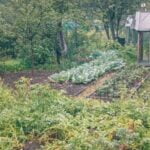Are you interested in starting a vegetable gardening in Colorado, but unsure of where to begin? One popular and effective method for growing vegetables in the challenging climate of Colorado is through raised bed gardening. In this article, we will explore the ins and outs of vegetable gardening in Colorado using raised beds. From choosing the right vegetables for Colorado’s unique climate to preparing the soil, planting, and maintaining your garden, we’ve got you covered.
Colorado’s climate presents some unique challenges for gardening, including unpredictable weather, intense sunlight, and often dry conditions. Raised bed gardening offers several benefits that make it an ideal option for vegetable gardening in Colorado. With improved soil drainage, better soil warming in cooler temperatures, and reduced risk of soil compaction, raised beds can help you overcome many of the challenges posed by Colorado’s climate.
In this article, we’ll delve into choosing the right vegetables for Colorado’s climate to ensure a successful harvest. We’ll also cover how to prepare the soil for your raised bed garden and provide tips for planting and maintaining your vegetable garden throughout the growing season.
For those inevitable challenges that come with gardening in Colorado-such as common pests and diseases-we’ll discuss strategies for managing these issues effectively. Whether you’re a seasoned gardener or new to vegetable gardening in Colorado, this article will provide valuable insights and practical tips for achieving success with your raised bed garden.
Benefits of Raised Bed Gardening in Colorado
Raised bed gardening offers several benefits for vegetable gardening in Colorado, including improved soil conditions, better drainage, and increased warmth for plants. In this section, we will explore the advantages of using raised beds for growing vegetables in the challenging climate of Colorado.
Improved Soil Conditions
One of the primary benefits of raised bed gardening in Colorado is the ability to control and optimize soil conditions. By using a mix of quality soil, compost, and other organic matter, gardeners can create an ideal growing environment for their vegetables.
This is especially important in Colorado, where the native soil may be alkaline or lacking in key nutrients. Additionally, raised beds can be filled with well-draining soil which prevents waterlogged roots – a common issue in Colorado’s heavy clay soils.
Better Drainage
In regions like Colorado where heavy rainstorms or snowmelt can lead to waterlogged soil, raised bed gardening provides better drainage for vegetables. The elevated nature of raised beds allows excess water to drain away more effectively than traditional ground-level gardens. This can help prevent root rot and other moisture-related issues that are common in wetter periods.
Increased Warmth for Plants
Due to its elevation and cooler temperatures compared to other states, Colorado’s growing season can be shorter. However, raised beds have the advantage of warming up faster in spring and staying warmer during the cooler months. This can extend the growing season for vegetables by a few weeks on both ends, allowing gardeners to enjoy a longer harvest period.
Overall, these benefits make raised bed gardening an attractive option for vegetable gardening in Colorado as it helps overcome some of the challenges presented by the state’s unique climate and soil conditions.
Choosing the Right Vegetables for Colorado’s Climate
When it comes to vegetable gardening in Colorado, choosing the right vegetables for the state’s unique climate is crucial to a successful harvest. The region’s high altitude, intense sunlight, and low humidity can pose challenges for some crops, but with careful selection, you can still enjoy a bountiful harvest from your raised bed garden.
Here are some of the best vegetables to consider for your Colorado raised bed garden:
- Tomatoes: Varieties such as Early Girl, Celebrity, and Big Beef are well-suited to Colorado’s climate and can thrive in raised beds with proper support.
- Peppers: Both sweet and hot pepper varieties, such as bell peppers, jalapenos, and habaneros, can do well in the warm, sunny conditions of Colorado.
- Carrots: These root vegetables are ideal for raised beds with loose soil and can tolerate cool temperatures.
In addition to these options, lettuce, spinach, kale, and Swiss chard are also good choices for a Colorado raised bed garden. These leafy greens can handle the state’s cooler spring and autumn temperatures. When selecting your vegetable varieties, it’s essential to consider the cold hardiness of the plants and their ability to withstand Colorado’s fluctuating weather conditions.
Lastly keep in mind that maintaining healthy soil through composting will greatly help promote strong growth in both fruits aned vegetables. For all yout planting needs look into companion planting techniques especially when working with small spaces like raides beds. By following these advice meticulously one can ensure a spread of colors throughout their blocks all while bringing an adequate meal supply home.
Preparing the Soil for Raised Bed Gardening in Colorado
When it comes to preparing the soil for raised bed gardening in Colorado, there are a few key factors to consider. First and foremost, it’s important to choose the right location for your raised beds. In Colorado, the soil can be notoriously rocky and full of clay, so opting for a sunny spot with good drainage is essential. Additionally, consider the proximity to water sources, as raised beds tend to dry out more quickly than traditional ground gardens.
Once you’ve chosen the perfect location for your raised bed garden, it’s time to prepare the soil. In Colorado, this often means amending the existing soil with organic matter such as compost or well-rotted manure. This will help improve both drainage and fertility, setting your vegetable garden up for success.
It’s also worth considering a soil test before planting your raised bed garden. This can provide valuable insight into nutrient levels and pH, which will help determine any additional amendments needed for optimal growing conditions. Taking the time to properly prepare the soil at the outset will pay off in healthier plants and a bountiful harvest down the line.
| Key Factors | Tips for Preparing Soil |
|---|---|
| Choose a sunny spot with good drainage | Amend existing soil with organic matter like compost or manure |
| Consider proximity to water sources | Conduct a soil test to determine nutrient levels and pH |
Planting and Maintaining Your Vegetable Garden
After preparing the soil for your raised bed garden in Colorado, it’s time to start planting and maintaining your vegetable garden. When choosing vegetables to plant, consider varieties that are well-suited to Colorado’s climate. Some popular choices include tomatoes, peppers, lettuce, carrots, radishes, and herbs like basil and thyme. These vegetables can thrive in the high altitude and fluctuating temperatures of Colorado.
When it comes to maintaining your vegetable garden, be sure to water regularly, especially during the hot and dry summer months in Colorado. Mulching around your plants can help retain moisture in the soil and prevent evaporation. Additionally, keep an eye out for any pests or diseases that may affect your plants. Regularly inspect your garden for signs of insect damage or wilting leaves.
In terms of care and maintenance, consider using organic fertilizers to provide necessary nutrients for your plants without introducing harmful chemicals into the environment. Pulling weeds regularly is also important for maintaining a healthy vegetable garden in Colorado. By staying on top of these tasks, you can ensure a successful growing season for your raised bed vegetable garden in Colorado.
| Vegetable | Suitable for Colorado Climate |
|---|---|
| Tomatoes | Yes |
| Peppers | Yes |
| Lettuce | Yes |
Dealing With Common Pests and Diseases in Colorado
When it comes to vegetable gardening in Colorado, one of the biggest challenges that gardeners face is dealing with common pests and diseases. Fortunately, there are several strategies that can be employed to minimize the impact of these issues on your raised bed garden.
One of the best ways to prevent pests and diseases from taking hold in your Colorado raised bed garden is to choose disease-resistant vegetable varieties. When planning your garden, research which varieties are known for their disease resistance and opt for those whenever possible.
Another effective strategy for dealing with common pests and diseases in a Colorado raised bed garden is to practice good crop rotation. By rotating your crops each year, you can help prevent the buildup of soil-borne diseases and reduce pest pressure. Consider implementing a three-year rotation plan, moving vegetables from different plant families into each bed on a rotating basis.
Finally, make sure to keep your raised bed garden clean and tidy. Regularly remove any debris or diseased plants, as well as any weeds that may harbor pests or diseases. Additionally, consider using row covers or other physical barriers to keep pests away from your plants.
- Choose disease-resistant vegetable varieties
- Practice good crop rotation
- Keep your raised bed garden clean and tidy
- Regularly remove debris, diseased plants, and weeds
- Use row covers or other physical barriers
Tips for Successful Vegetable Gardening in Colorado
When it comes to successful vegetable gardening in Colorado, there are a few key tips to keep in mind. The unique climate and soil conditions of the state can present some challenges, but with the right knowledge and techniques, you can grow a thriving garden in your raised beds.
Choose the Right Varieties
One of the most important tips for successful vegetable gardening in Colorado is to choose varieties that are well-suited to the state’s climate. Look for vegetables that have been specifically bred for cooler temperatures and shorter growing seasons. Some good options include cold-hardy greens like kale and Swiss chard, as well as root vegetables like carrots and beets.
Pay Attention to Watering
In Colorado’s arid climate, proper watering is essential for a successful vegetable garden. Raised bed gardening allows for better drainage and water retention, but it’s still important to monitor moisture levels and water consistently. Consider installing a drip irrigation system or using soaker hoses to ensure that your plants get the water they need without wasting any.
Protect Your Garden From Wildlife
In Colorado, wildlife like deer, rabbits, and groundhogs can pose a threat to your vegetable garden. To protect your plants, consider installing fencing around your raised beds or using deterrents like netting or repellents. It’s also a good idea to regularly inspect your garden for signs of pest damage and take action quickly if necessary.
By following these tips for successful vegetable gardening in Colorado raised bed gardens, you can enjoy a bountiful harvest of fresh, homegrown produce throughout the growing season.
Harvesting and Preserving Your Colorado Raised Bed Garden’s Bounty
After all the hard work of preparing the soil, planting, and maintaining your Colorado raised bed garden, it is finally time to enjoy the fruits of your labor. Harvesting your vegetables at the peak of their ripeness is essential to ensure the best flavor and nutritional value.
When harvesting your vegetables, be sure to use sharp scissors or pruners to avoid damaging the plants. For leafy greens like lettuce and spinach, only pick what you plan on using immediately to ensure freshness.
Preserving your bountiful harvest is a great way to enjoy homegrown produce throughout the year. Colorado’s short growing season makes preservation techniques such as canning, freezing, and drying important for extending the shelf life of your vegetables. Canning is a popular method for preserving high-acid vegetables like tomatoes or pickles, while freezing works well for beans, peas, and corn. Drying herbs in a well-ventilated area allows you to have flavorful additions to meals all year long.
It’s important to remember that not all preservation methods work for every type of vegetable. Be sure to research the best preservation techniques for each vegetable in order to maintain their flavor and texture. By properly harvesting and preserving your Colorado raised bed garden’s bounty, you can enjoy fresh, homegrown produce long after the growing season has ended.
Conclusion
In conclusion, vegetable gardening in Colorado raised bed gardens can be a rewarding and fruitful experience for both novice and experienced gardeners. By utilizing the benefits of raised bed gardening, such as improved drainage and soil quality, gardeners can overcome some of the challenges presented by Colorado’s unique climate. Additionally, choosing the right vegetables for Colorado’s climate and properly preparing the soil are essential steps in ensuring a successful harvest.
As you enjoy the fruits of your labor in your Colorado raised bed garden, it’s important to remember the hard work and dedication that went into creating and maintaining your garden. Whether you’re harvesting an abundance of tomatoes or preserving your crop for future enjoyment, take pride in knowing that you have successfully navigated the challenges of vegetable gardening in Colorado.
Furthermore, dealing with common pests and diseases in Colorado can be a challenge, but with proper care and attention, these issues can be managed effectively. By following the tips for successful vegetable gardening in Colorado outlined in this article, you can maximize the yield of your garden while minimizing potential problems. So go ahead, savor the flavor of a homegrown tomato or crisp lettuce leaf from your own Colorado raised bed garden – all thanks to your hard work and determination.
Frequently Asked Questions
When Should I Start a Vegetable Garden in Colorado?
In Colorado, the best time to start a vegetable garden is in late April or early May, after the last frost date for your area. This will give your vegetables the best chance of thriving in the warmer temperatures.
What Vegetables Should Not Be Grown in a Raised Bed?
There are certain vegetables that should not be grown in raised beds, including those with deep roots like potatoes and sweet potatoes. These types of vegetables need more space to grow and develop properly.
What Vegetables Grow Well in Raised Beds?
Many vegetables actually thrive in raised beds, including tomatoes, peppers, lettuce, spinach, radishes, carrots, and herbs like basil and cilantro. These plants benefit from the well-drained soil and warmer temperatures typically found in raised beds.

If you’re looking to get into vegetable gardening, or are just looking for some tips on how to make your current garden better, then you’ve come to the right place! My name is Ethel and I have been gardening for years. In this blog, I’m going to share with you some of my best tips on how to create a successful vegetable garden.





